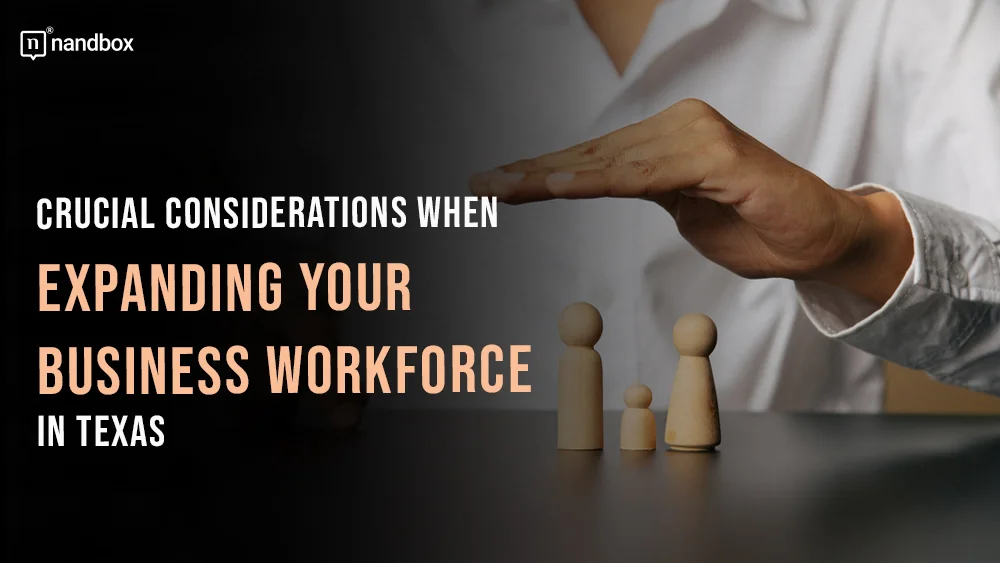Key Factors to Consider When Growing Your Business Team in Texas
Thinking of expanding your business workforce in Texas? It would be a wise move, no pun intended.
The Lone Star State remains at the top of America’s best states for business thanks to its business-friendly climate, diverse economy, the fact that it has zero personal and corporate state income tax, and, perhaps importantly for this context, it has a skilled and growing workforce.
But of course, expanding your business in any state, including Texas, comes with its own set of considerations. While the Lone Star State offers many attractive opportunities for growth, going through this process requires careful planning and attention to several important factors.
Navigating the Regulatory Landscape
The legal and regulatory climate in Texas is not only relatively straightforward but also very business-friendly, meaning the process for obtaining everything from permits to licenses tends to be quick and painless.
As a bonus, the government here offers various incentives for businesses. For example, The Texas Enterprise Fund (TEF) is one of the largest “deal-closing” funds in the nation, used as a performance-based financial incentive for projects that offer capital investment and job creation.
There’s also the Texas Small Business Credit Initiative (TSBCI), which supports state programs that provide resources to assist small business growth. This same initiative also helps small businesses that are traditionally marginalized.
Tax Responsibilities
One of the greatest things about Texas is that there’s no state income tax, which means more money for businesses such as yours. But that doesn’t mean you have zero tax obligations, of course—there are always federal taxes to withhold and unemployment and disability taxes to pay. Thankfully, resources such as OnPay’s Texas paycheck calculator make everything easier, allowing you to always accurately calculate payroll taxes for your employees.
On top of zero income tax, Texas also offers various tax incentives to encourage business growth. Thanks to state incentive programs such as TEF and the Texas Economic Development Act, there are plenty of opportunities to save money and reinvest it back into your business. This is particularly true for manufacturing, healthcare, and agriculture industries, but other businesses can also apply. This is where a tax consultation with a licensed accountant can help you. They can answer all your questions to help you maintain tax compliance.
Exploring Talent Pool
Need to hear more great things about Texas? Well, how about this: not only is this state’s labor pool large and skilled, it’s also younger than average, which means your business has a great chance of being successful now and in the future. Yes, even Gen Z is flocking to Texas!
Thanks to excellent higher education institutions that are churning out graduates—most of whom stay in Texas—in fields ranging from engineering to finance, you should have no trouble finding the talent you need to succeed. And with a lower cost of living compared to other major tech hubs, you can attract top talent without stretching your budget.
Indeed, the Lone Star State boasts some of the largest and most talented labor pool, so attracting top talent who aligns with your organization’s values should be easy.
Office Rent and Utilities
Finding the perfect office space is no easy task, but luckily for you, Texas has no shortage of commercial real estate options to choose from. Most importantly, these options also tend to have reasonable rent rates—certainly cheaper than other major metropolitan areas! For the sake of comparison, class A office rents cost $35.41 per square foot in Texas, while they cost $55.92 in California and $68.40 in New York.
In addition to this, utility costs in Texas are often lower than in other states, which can further reduce your overhead expenses. With lower electricity, water, and heating bills, you can allocate more resources towards expanding your workforce and enhancing your business operations.
Infrastructure and Transportation
Speaking of office rent, when choosing a location for your business office space, make sure you factor in commute times and accessibility. While Texas has a robust infrastructure, including an extensive system of highways, railways, and airports such as Dallas/Fort Worth International Airport (DFW), traffic congestion can be a challenge in major metropolitan areas like Houston, Austin, and Dallas.
So again, when choosing your office space, take these things into account. Consider proximity to major highways and interstates, public transportation options, and, if appropriate for your specific needs, how near (or far) airports and ports for international travel are from your potential office.
And, since you’ll be expanding your workforce and operational needs, it might also be a good idea to evaluate the availability of warehouses and manufacturing facilities near your new office.
Cost of Living
Another consideration is the cost of living for your employees. While the Lone Star State is known for its relatively affordable housing and low taxes, it’s important to remember that the cost of living can vary quite significantly depending on the location.
Naturally, major cities like Austin, Dallas, and Houston have higher living expenses compared to smaller towns and rural areas, which include not only housing but also groceries and healthcare. If most of your employees live in these cities, you should make sure that their salaries are competitive and sufficient to maintain a comfortable standard of living. Where most of your employees will reside will, for the most part, depend on where your office will be located.
If you’re looking to attract top talent—which, if you’re aiming for long-term success, you really should—you need to make sure you’re also offering benefits such as healthcare coverage, retirement plans, and flexible work arrangements, as these can help offset the cost (and stress!) of living and boost employee satisfaction, and therefore productivity and loyalty.
Cultural Considerations
Finally, when expanding your workforce in Texas, there are also some cultural considerations to take into account. Texas prides itself on its Southern hospitality but it’s also known for its cultural diversity, which can be both a strength and a challenge when expanding your workforce.
While it’s a well-known fact that diversity and an inclusive work environment can lead to increased innovation, problem-solving, and employee satisfaction, it’s crucial to assemble your workforce carefully and sensitively to ensure all your employees feel valued and respected at the end of each work day.
Final Thoughts
If you’re thinking of expanding your business workforce in Texas, we say go for it. With its business-friendly environment, low taxes, and access to top talent, The Lone Star State offers a variety of exciting opportunities for growth. With careful planning and a focus on fostering a positive and inclusive workplace culture, you can build a talented, motivated, and, above all, successful team in Texas.





